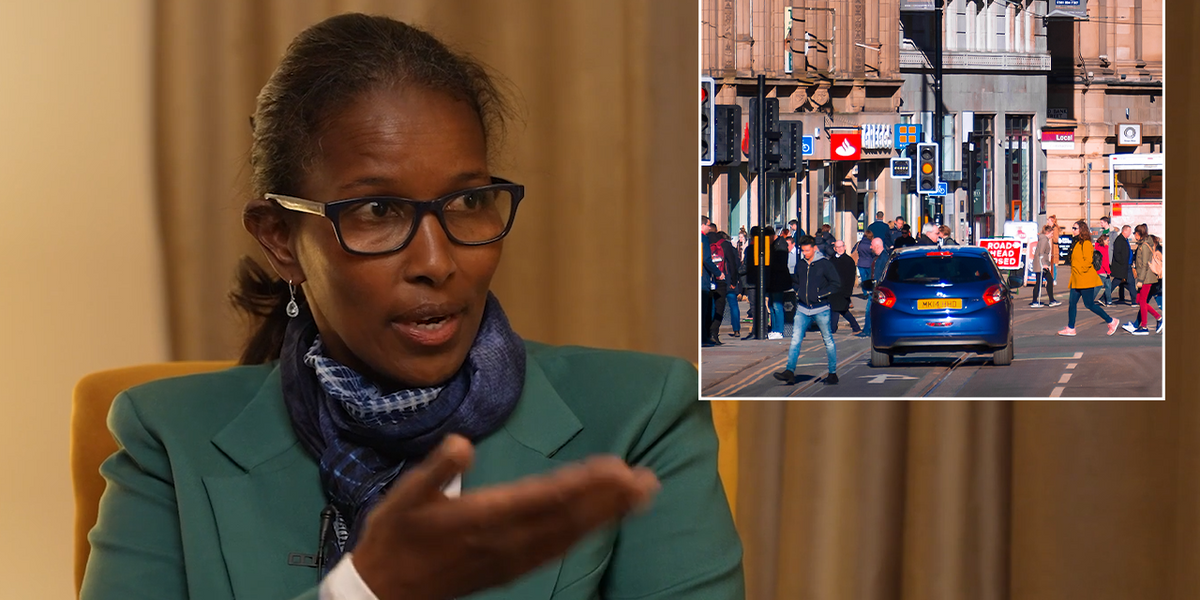



Ayaan Hirsi Ali has cautioned that Western countries face the prospect of transforming into societies resembling Somalia, citing demographic shifts and welfare policies that lack integration demands.
Speaking on GB News, she highlighted how incoming populations establish themselves whilst accessing state benefits without reciprocal obligations.
"You can have, you know, the welfare state, whatever it is it offers you, you can have it. You don't have to give anything in return," she stated.
Her concerns centre on the combination of declining birth rates among Western populations and increasing arrivals from different cultural backgrounds.

Ayaan Hirsi Ali fears Britain is going through a rapid demographic change
|GB NEWS / GETTY
She emphasised that newcomers to Britain, America or other Western nations should understand "this is how we live with. Here are the rules."
Recent figures reveal England and Wales experienced their second-highest yearly population surge in over seven decades, with numbers climbing by 706,881 in the twelve months ending June 2024.
The Office for National Statistics attributed virtually all growth to international migration, which contributed 690,147 to the total increase. Over 1.1 million individuals arrived during this period whilst approximately 452,000 departed.
This follows an even steeper rise of 821,210 the previous year, meaning the two-year period saw unprecedented growth exceeding 1.5 million people.

Hirsi Ali said Britain is becoming Somalia
|GB NEWS
Migration has driven population expansion every year since 1999, but recent increases mark a dramatic acceleration.
Reform UK leader Nigel Farage branded the statistics "disastrous for the quality of life for everyone in the country", citing unbearable strain on public services and community cohesion.
Ali identified the Muslim Brotherhood as a significant factor preventing successful integration, noting the organisation explicitly instructs Muslim immigrants: "Do not assimilate, do not adopt the values of the West."
She described current circumstances as a "cocktail of problems" where immigrant expectations clash with those of Western host societies. The solution, she argued, requires frank and transparent dialogue about cultural expectations.
 A screengrab of migrants departing France in a small boat | GB NEWS
A screengrab of migrants departing France in a small boat | GB NEWS
Her gravest concern involves deteriorating safety for women in European cities. "I feel safe in Jerusalem. I don't feel safe in Paris, Berlin, Amsterdam, London. That is crazy," she declared.
She questioned why Western societies appear willing to compromise women's security, asking whether this represents some form of atonement.
Despite consulting numerous people, she remains puzzled by host nations' responses to these challenges.
The demographic transformation Ali describes aligns with official data showing migration's unprecedented impact on Britain's population composition. The London borough of Newham exemplifies these changes, recording a 4.7 per cent population increase last year - the highest in England.
This rapid growth in one of the capital's most deprived areas has coincided with elevated rates of welfare dependency, violent crime and drug-related offences. Such localised examples illustrate Ali's broader concerns about integration failures and their consequences.
Prime Minister Sir Keir Starmer has acknowledged migration causes "incalculable damage" and pledged stricter controls, including banning overseas care worker recruitment and imposing tougher language requirements.
However, Ali's warnings suggest these measures may prove insufficient without addressing fundamental questions about cultural integration and reciprocal obligations between newcomers and host societies.
